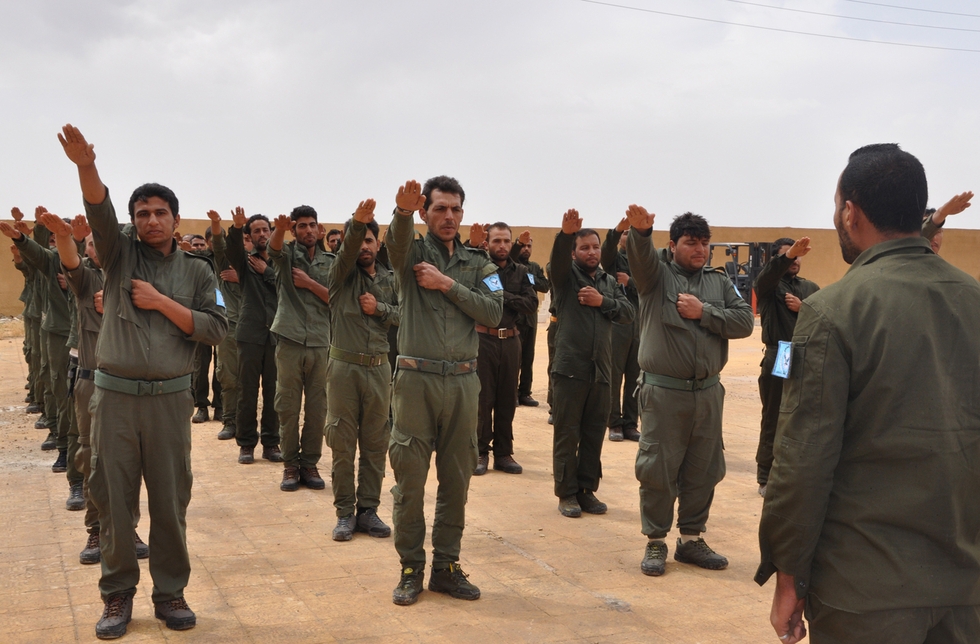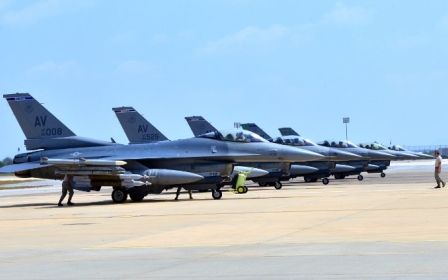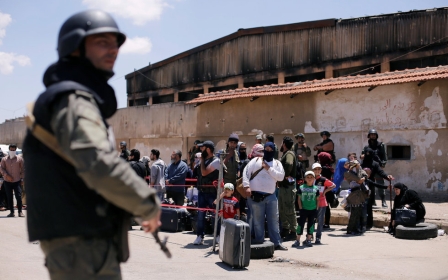Anti-IS coalition trains policemen for Syria's Raqqa

Dozens of young men gathered on Tuesday in a school yard in northern Syria to take the oath at a police graduation ceremony after a week's training supervised by the US-led coalition.
They were the first batch of policemen to be trained by the coalition to maintain law and order in Raqqa, as a Kurdish-Arab alliance battles to expel the Islamic State (IS) group from the rest of the northern province.
Police officers disappeared from Raqqa when the province was taken over by armed rebel groups after the Syrian conflict broke out in 2011. The city then fell in 2014 to IS, and was named its capital.
Dressed in green uniforms, the graduates stood to attention in the town of Ain Issa, a former IS stronghold around 50 kilometres north of Raqqa.
On their arms, they wore light blue patches bearing the image of an eagle with its wings spread and the words "Raqqa Internal Security Force".
"I swear to God to be loyal to my nation, my people and my country and to fulfil my duty," they said, right arms stretched out in front of them.
They took the oath before members of a civilian council to administer Raqqa city and the surrounding province, before each receiving a Kalashnikov assault rifle.
"Fifty young men from the Raqqa province followed a seven-day training course under the supervision of US and Jordanian officers," said a spokesman for the nascent Raqqa Civilian Council.
"The second group will start training next week. The aim is to train 3,000 young men to guarantee security and stability in liberated areas of the Raqqa province," Omar Alloush said.
'Bloodshed needs to stop'
The coalition, which has been fighting IS in Syria and neighbouring Iraq since 2014, is in charge of training the policemen and providing them with equipment, he said.
A Jordanian instructor, who asked to remain anonymous, said all the graduates had received "intensive training on how to conduct patrols, diffuse disputes, deal with car bombs and suicide bombers, and how to man a checkpoint".
Backed by the coalition, the Syrian Democratic Forces launched an offensive to capture Raqqa city in November.
Last month, the SDF alliance announced the creation of the civilian council to administer the city after its capture.
All members of the new security force are Arabs, as they will have to police Raqqa city whose population is mostly Sunni Arab - after its Kurdish minority fled when IS overran the provincial capital in 2014.
Some previously belonged to the Kurdish Asayesh security forces, while others returned to the province after the SDF retook parts of it from the militants.
"I was working in Lebanon. I came back after my village was liberated to help maintain security," said Qamar al-Madan, a 23-year-old from Tal Assamen.
"The bloodshed needs to stop, as does the age of oppression under Daesh," he said, using an Arabic acronym for IS.
Meanwhile, an uptick of strikes by the US-led coalition has led to an increase in civilian deaths, according to the monitoring group Airwars.
The Airwars monitoring website last month reported a 26 percent increase in reported actions in Syria with 548 strikes carried out in April, the highest monthly tally since the beginning of the coalition campaign.
“Around Raqqa in particular – where most strikes are by the US – we are seeing high civilian casualties where six months ago we would not," said Chris Woods, Airwars' director.
"This is the clearest evidence yet that protections for civilians on the battlefield appear to have been scaled back – with the inevitable consequence of higher deaths and injuries.
"As the battle for Raqqa itself approaches, we therefore remain extremely concerned for the fate of hundreds of thousands of civilians still trapped within the city.”
New MEE newsletter: Jerusalem Dispatch
Sign up to get the latest insights and analysis on Israel-Palestine, alongside Turkey Unpacked and other MEE newsletters
Middle East Eye delivers independent and unrivalled coverage and analysis of the Middle East, North Africa and beyond. To learn more about republishing this content and the associated fees, please fill out this form. More about MEE can be found here.




